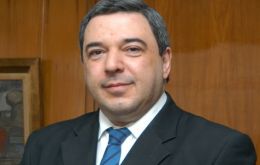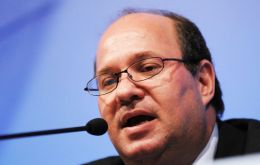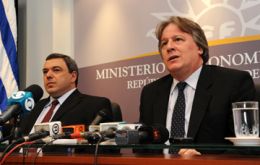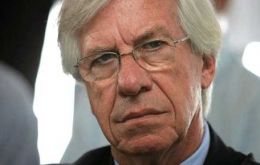MercoPress. South Atlantic News Agency
Tag: Mario Bergara
-
Friday, May 2nd 2014 - 09:27 UTC
Uruguay's budget fiscal deficit climbs in March to its highest since October 2003

Uruguay's fiscal deficit climbed to 3.2% of GDP during March, the highest since October 2003, --equivalent to 1.69 billion dollars--, but Economy minister Mario Bergara said that there is no risk for “the sustainability of public accounts or sustainability of current macroeconomic policies”.
-
Friday, April 4th 2014 - 04:35 UTC
Uruguayan government feels it can tame inflation based on March's index

Inflation in Uruguay during March reached 0.58% accumulating 4.74% in the first quarter and 9.73% in the last twelve months, which is seen as 'positive' and an indication that recent measures to contain prices are 'being successful', according to Economy minister Mario Bergara.
-
Saturday, March 15th 2014 - 08:13 UTC
Uruguay combats inflation with price agreements and reducing taxes on public utilities rates

The Uruguayan government finalized on Friday a prices agreement with commerce and trade organizations to help bring down the third highest inflation of the region which is advancing at an almost two-digit pace. The package is to be completed with government fiscal 'sacrifice' such as the elimination of taxes on some public utilities rates.
-
Friday, February 21st 2014 - 08:05 UTC
Uruguay lowers growth estimate for 2014 to 3% of GDP; inflation still a challenge

Uruguay's GDP this year is expected to expand by 3%, below the original estimate of 4%, according to Economy minister Mario Bergara currently in the United States on a tour to promote investments in the country and who was interviewed by Bloomberg.
-
Tuesday, February 11th 2014 - 23:44 UTC
“It is not clear where the Argentine government is heading or who is in charge”

It is not clear where the government commanded by Argentine president Cristina Fernández is heading to, Economy Minister of neighboring Uruguay Mario Bergara affirmed saying the economic ups and downs in Argentina have deeply impacted on Uruguayan exports, tourism and real estate activities.
-
Friday, December 27th 2013 - 05:32 UTC
Uruguay's new Economy minister pledges continuity of current market friendly policies

Uruguay will continue to consolidate its market friendly policies, pledged incoming Economy minister Mario Bergara, 48. on taking office on Thursday surrounded by President Jose Mujica and Vice president Danilo Astori. He replaced Fernando Lorenzo who was forced to resign following a major scandal involving the failure and shut down of the country's flag air carrier Pluna.
-
Saturday, December 21st 2013 - 21:22 UTC
Uruguay Economy minister resigns over scandal involving flag air carrier Pluna

Uruguay's economy minister Fernando Lorenzo resigned on Saturday in the face of questions over the alleged irregular sale of government-owned airplanes following the closure of Pluna, the country's flag carrier, President Jose Mujica announced at a brief press conference, with no questions taken, next to Vice president Danilo Astori.
-
Tuesday, December 17th 2013 - 19:10 UTC
Uruguay must address fiscal policy (and inflation) suggests leading private bank

The US dollar is poised to continue consolidating during 2014 in Uruguay, and will most probably by the end of the year reach 24 Pesos from the current 21 Pesos, according to Itaú, one of the leading private banks in the country, which also warned about inflation and the fiscal deficit.
-
Friday, June 7th 2013 - 05:40 UTC
Uruguay tightens terms for the inflow of short-term capital inflows

Uruguay announced on Thursday new measures to discourage short term speculative capital inflows that have appreciated the Peso, eroded the country’s international competitiveness, made imports cheaper than domestic production and threaten an already stubborn inflation.
-
Wednesday, May 22nd 2013 - 05:53 UTC
Uruguay’s main problem is high inflation but no policy changes planned, says Astori

Uruguay's main economic problem is high inflation, and policymakers will continue to use interest rates and bank reserve requirements to bring it under control, Vice President Danilo Astori said on Tuesday. Consumer prices in Uruguay rose 8.14% in the 12 months through April, far outside the country's official annual target range of 4 to 6%.
